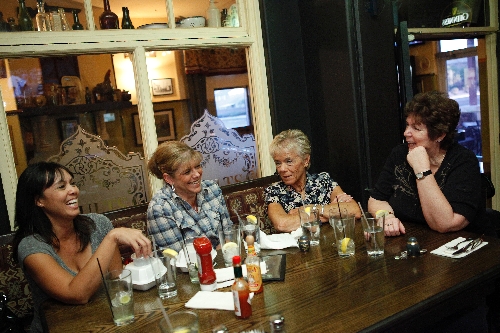Family remembers life, not death, of beating victim
Somehow, justice always seemed to elude Lawrence Compehos Jr. and his family.
But that's not the point his relatives want to make now, as they look toward the 20th anniversary of the injustice that forever changed his life and, ultimately, caused his death.
During a recent interview with his mother and sister at the North Las Vegas home they once shared with Compehos, both women were at a loss for words when asked what they wanted readers to take away from a story about his ordeal. Both followed up with emails after having more time to reflect on the question.
"Speaking for myself, I don't want people to read the article and feel sorry for my brother or angry for his injustice," wrote his sister, Sonya Henney. "I want people to be inspired by his ability to live his life as it was dealt to him."
His mother, Peggy Compehos, has a similar desire: She wants the story to bring hope to others in similar circumstances.
PAIR PLEAD GUILTY, THEN FLEE
The story begins on July 6, 1992.
Compehos, a 23-year-old waiter from Hawaii known as "Lo," was working that morning at Anthony's Club & Casino, then located at 377 E. Flamingo Road, when he noticed two male patrons hassling a female employee.
He intervened, and that made the men angry.
Compehos told police he tried to avoid a fight, but the pair jumped him anyway.
"After that I couldn't defend myself, because I could see them kicking me on my back and neck, and I couldn't lift my arms to defend myself," he told a police detective.
In an instant, Compehos had become a quadriplegic.
Although he had feeling in his entire body, he could not move his legs, and he had only partial use of one arm.
After the beating, officers arrested Rosendo Carrizales Garcia, 22, and his 29-year-old brother, Sergio. Police described the men as registered aliens from Monterrey, Mexico.
The brothers struck a deal with prosecutors to reduce a charge of battery with substantial bodily harm to attempted battery in exchange for guilty pleas.
That meant the maximum possible sentence for each man dropped from 10 years to five years.
"I thought it was a strong enough case that there was no reason to give them such a favorable negotiation, especially in light of the devastating injuries he sustained," Compehos' former lawyer, Michael Villani, said recently.
Villani, now a Clark County district judge, represented Compehos for free after the attack and helped him receive compensation from the State Industrial Insurance System.
David Roger, the young prosecutor assigned to the battery case, said he agreed to the plea bargain for several reasons. He said the men had no prior felony arrests, and he wanted to spare Compehos the trauma of reliving the incident.
Roger, who went on to become Clark County's district attorney, also said he didn't believe the Garcias intended to paralyze their victim.
But Compehos told the Las Vegas Review-Journal he would have preferred to testify at a trial if doing so meant longer sentences for the defendants.
In fact, he showed up to speak at their sentencing hearing in May 1993, when he saw the brothers for the first time since the attack.
But District Judge Gerard Bongiovanni agreed to postpone the hearing for nine days at the request of the defendants' attorneys, and when the new date arrived, the brothers were nowhere to be found. The judge then issued no-bail bench warrants for their arrests.
In the years that followed, Compehos and his family lived in fear that the Garcia brothers would find him and do him further harm. They also lamented the lack of justice in the case, although Compehos said he tried not to dwell on it.
"I try to be happy all the time," he told the Review-Journal in 1999.
At the time, the Compehos family had recently learned that Rosendo Garcia had been arrested in November 1995, just two months after the Review-Journal had published one of its stories on the case.
The family also had learned that he was sentenced in February 1996 to five years in prison for his crime against Compehos, and that he was paroled in April 1998 - all without the victim's knowledge or input.
"All along the line, ever since this accident, everything that has happened has not been on his side," Henney, then known as Sonya Compehos, said at the time. "Something always happens to make it more of an injustice, and these guys slip through the cracks every time."
Shortly after Rosendo Garcia's release from prison, he was deported to Mexico.
ASHES SPREAD IN HAWAII
During the 1999 interview, Compehos said he still felt like he was the same age as when he was injured.
"You never get over that mindset, I guess," he said. "When I dream, I never dream of myself in the chair."
Peggy Compehos moved to Southern Nevada with her daughter and granddaughter after the attack.
Her husband, also named Lawrence, continued working as a firefighter in Hawaii but is now retired.
"Sometimes I feel like it's all my fault that everybody had to stop their lives and come out here," Compehos once said.
He never returned to Hawaii, although most of his ashes were spread there.
Peggy Compehos said her son had many good years. Once a week, he would go out for several hours, spending time on his own at a sports book and then meeting his family for dinner and a movie. He also liked to do his own shopping.
"He was out and about," his mother said recently. "He liked to be as independent as allowed."
Compehos also enjoyed listening to recordings of books.
Peggy Compehos still has a list of the more than 500 audio books she checked out of the library for her son.
"I think if Lawrence had a tough life, he made the best of it," she said.
But his health began deteriorating at the end of 2007. He spent January 2008 at home, then was in and out of medical facilities for the rest of the year.
Compehos died on Dec. 21, 2008, at University Medical Center. He was 39.
Peggy Compehos said her son had gone to the hospital for outpatient surgery.
"He was going to be home for the Super Bowl," she recalled. "That was his plan."
An autopsy report from the Clark County coroner's office classified the death as a homicide.
Family members were surprised by that determination but welcomed the news. Henney said they thought it meant "something more could be done" to the Garcia brothers.
Records show that Las Vegas police were notified, but Roger, who recently stepped down from his position as district attorney, said he has no memory of the case coming to his office after Compehos' death.
'NEVER BITTER'
Peggy Compehos said police informed the family that the Garcias could not be charged in connection with the death because her son had lived too long after the beating.
But in 1999, the Nevada Legislature had repealed a law blocking murder prosecutions in cases where a homicide victim died more than one year and one day after being attacked.
The change in the law was sparked by the case of local race car driver Chris Trickle, shot while driving along state Route 160 in 1997. He died 13 months later, but a murder prosecution was barred because of the provisions of the old law.
Assistant District Attorney Chris Owens was not familiar with Compehos' case and said he would have to do some research to determine which law applied to his death. Owens could find no record of the matter coming back to the district attorney's office after Compehos died.
Owens and Roger said the U.S. Supreme Court has ruled that double jeopardy does not prevent additional prosecution in cases where a defendant pleaded guilty to a lesser charge before a victim's death. In addition, murder has no statute of limitations.
While Henney and her mother still want justice for Compehos, they also know what they don't want.
"We don't want to have him forgotten," Peggy Compehos said.
"And what happened to him," Henney added.
In her follow-up email, Henney wrote, "Lawrence was trapped in his body for 16 years, but managed to live his life without burying himself in sorrow and hate. He had a good sense of humor, a generous heart, and a sharp mind."
Peggy Compehos recalled her son's smile, which "could light up a room."
And Villani remembered Compehos as someone who was "never bitter."
"There's just certain cases, certain clients, that will always stick in your mind, and he was one of those," Villani said.
Contact reporter Carri Geer Thevenot at cgeer@reviewjournal.com or 702-384-8710.



















